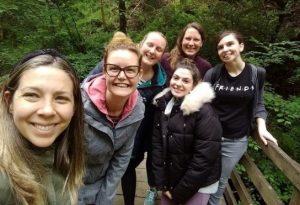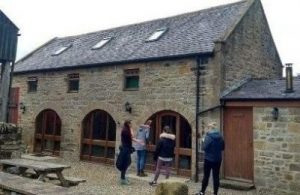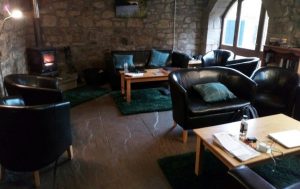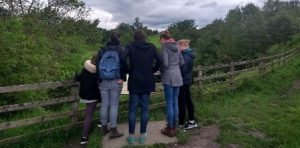This year, Newcastle University’s Sociology PGR cohort went on our very first residential writing retreat. First year PhD student Angela Plessas, one of our PGR reps, writes here about her experience of helping organise the event (we are pleased to report she has nearly recovered from the experience).
Early this academic year, Newcastle University’s Sociology PGRs decided it would be a great idea to organise an off-campus writing retreat: a fun way to spend some focused time writing, while also providing a chance for us to get to know each other a bit better, thereby strengthening the PGR community. As one of this year’s PGR reps, I volunteered to help organise the event.
Of course, doing so was not entirely straightforward as there were a few hurdles to overcome. However, in the end, with the support of Sociology’s PGR Director Lisa Garforth (thanks Lisa!), we succeeded in putting together an event which catered to our individual writing needs while also making writing a fun and social experience.
First, we needed place to stay – somewhere that was relatively nearby and accessible, had suitable writing spaces and allowed us to keep within our available budget. Finding this kind of accommodation was a little difficult, but after much searching and a few false starts, we found one location that met nearly all of our needs: a YHA bunkhouse just outside of Hexham.
Next, we needed to get there. Again, arranging transport was far more challenging than expected. Restrictions on which minibus companies we could use, who was able to drive the minibus, etc., flummoxed all of our early planning attempts. Thankfully, we eventually found a minibus company that was both within our budget and on the university’s approved list of taxi companies! Result.
Once the basic details were in place, we got together as a group to finalise the specific details of the retreat. We agreed on the importance of goal setting and ensuring the retreat was well-structured. We also discussed practical arrangements such as cooking and who would bring what in terms of food contributions.
Having a clear structure laid out before our arrival played a major role in our productivity (thanks to Clare who wrote up a great structure and timetable for the retreat, with a mix of writing and group activities!). Although we were fairly disciplined in sticking to the timetable – particularly our planned one and a half hour writing sessions – we did adjust it slightly by taking a more informal approach to the peer mentoring and goal-discussion sessions, as well as the final debrief at the end. Doing this worked well for us, and as a group we really succeeded at sharing ideas, concerns and experiences, and encouraged one another to make the most of this intensive writing period.
Planning breaks into the structure, and even fitting in a walk to the nearby Hareshaw Linn Waterfall, gave us the time and space to think reflexively in a new and unfamiliar setting and to ensure that the time spent away from campus was especially productive.
The decision to set goals a couple of weeks before the writing retreat was also especially useful – it meant that we each knew exactly what we were working on, could prepare accordingly and were able to sit down as a group, eliminate distractions and work collectively towards achieving our individual writing aims.
For future writing retreats I think that trying out specific writing techniques such as the pomodoro technique (which involves working on a particular writing task within 25 minute slots), organising timed writing activities such as ‘free’ and ‘generative’ thesis writing within these 25 minute slots, or arranging sessions dedicated specifically to reading one another’s work and sharing feedback, might help us to work on developing specific writing skills and introduce us to new writing strategies aimed at increasing efficiency and productivity. Nonetheless, for a first writing retreat, this proved to be a great opportunity to spend time with our fellow Sociology PGRs, while also giving each of us dedicated writing time in a supportive and relaxed environment. We are already planning the next one! (We are thinking Greece, but aren’t sure the budget will stretch!)






